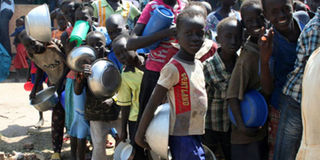Prime
Tackle obstacles to humanitarian aid safety, security

Uganda is now home to 1.4 million refugees mostly in need of humanitarian aid. FILE/PHOTO.
The year 2020 will be remembered as the year in which Covid-19 led to the worse humanitarian challenge of our time. Adding to the usual humanitarian triggers such as war and other natural calamities, they continue to be a major obstacle to development.
In 2020, the humanitarian world got a major battering. Even the people needing the usual aid received little if any assistance compared to the previous year. The shoe-string budgets could not meet all the humanitarian emergencies that were experienced. Organisations were forced to burst their emergency funding in order to be able to deal with the new normal.
Being the top most humanitarian emergency of 2020, Covid-19 did not spare any country. Even countries with the best health systems were brought to their knees. Deaths were in hundreds of thousands as infections increased. What started as a minor public health hiccup in Wuhan, China, would turn out to be the pandemic that it is today.
We still do not know how much damage Covid-19 will cause unless a cure is found, or until all people get vaccinated. Covid-19 grounded air transport around the world, leaving fleets of aircraft parked at airports worldwide.
On other front, refugees face reduced support as funding is being committed to fighting Covid-19. Migrants cross dangerous seas using unsafe means, leading to a number of them capsising while trying to reach their dream destinations. So, the ability of vulnerable people to cope with their vulnerability-causing hazards was hindered.
On the humanitarian front, we saw NGO workers and beneficiaries face untold violence. Humanitarian workers got killed while providing support. Vulnerable communities continued to be subjected to torture, racial abuse, segregation, sexual abuse and gender -based violence. Journalists covering humanitarian hardships got killed too. We had refugee communities fighting with local communities to demand their rights.
All these would combine to cause suffering of beneficiaries because they were not getting access to services that are meant for them. Besides, humanitarian aid in 2020 remained insecure.
Simon J. Mone,
[email protected]




